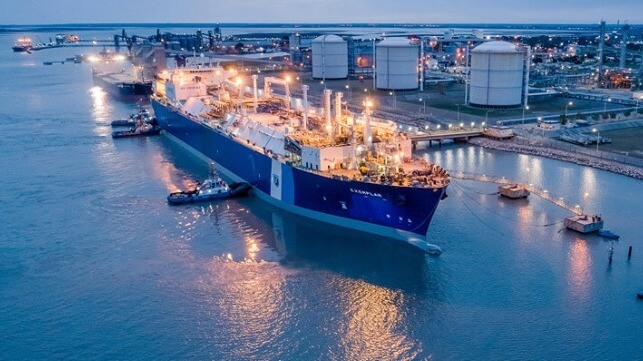Germany Charters Fifth FSRU as Part of Long-Term Energy Plan

The German government announced plans for its fifth Floating Storage Regasification Unit (FSRU) as part of the effort to replace the gas that it previously imported from Russia. Texas-based Excelerate Energy signed an agreement with ENGIE, which is responsible for chartering the FSRU on behalf of the German Federal Government. It will be located at the port of Wilhelmshaven with Tree Energy Solutions (TES) responsible for the development and operation of the FSRU.
The fifth FSRU arranged by the government, which is planning to start at the beginning of the 2023 heating season, will be on a five-year charter and will have an annual importing capacity of about 5 billion cubic meters (bcm). According to the government, it will provide about five percent of the annual gas consumption in Germany and will contribute to enhancing Europe’s and Germany’s energy security. It is in addition to the 20bcm of capacity established with the first four charters by the government, with Deutsche ReGas also developing a separate, private LNG import effort.
“By importing liquefied natural gas, we are making ourselves less dependent on imports of Russian pipeline gas,” said Federal Minister for Economic Affairs and Climate Protection, Robert Habeck. “All steps that free us from the uncertainty of Russian imports as quickly as possible are more necessary than ever in these times.”
Russia exported 142 billion cubic meters of natural gas via pipelines into Europe in 2021 with Germany being one of the largest users consuming approximately a total of 95 billion cubic meters of gas per year. Approximately half of Germany’s LNG supply was being imported from Russia. Previously, Germany had no regasification facilities, but the country is now fast-tracking LNG imports.
The federal government announced in May that it was committing more than $3 billion to launch the LNG import program. Energy giants RWE and Uniper entered into agreements to launch the country’s first liquified natural gas import terminals. Expected to be online for the 2022-2023 winter season, they each agreed to charter two FSRUs which the government announced would meet about a fifth of Germany’s gas needs.
Uniper agreed to build and operate an LNG terminal for the federal government connecting to the existing infrastructure in Wilhelmshaven. The facility will serve the first two FSRU units which are being managed by Dynagas. RWE is also chartering two additional FSRU units that will also be in place for the upcoming winter season. These vessels are owned by Höegh LNG, which will also handle technical operations.
In addition to providing for the immediate needs, the project also seeks to establish the infrastructure for the long-term import of LNG as well as the basis for the transition to new sources of green energy. According to TES, the new project will fast-track its Wilhelmshaven hydrogen terminal, scheduled to commence operations in 2025. TES is building what it calls the largest Green Energy Hub in Europe that will offer a unique model to convert large amounts of renewable electrons from sunny and windy locations into green hydrogen and affordable, renewable gas. Uniper also plans to expand its facility to support the import of ammonia.
The TES terminal’s structure will ultimately include six ship berths, two million cubic meters of onshore storage using 10 on-site tanks, and direct access to the natural gas, hydrogen, and CO2 pipeline networks required for decarbonization and net zero energy supply.
RWE also plans to have its first FRSU vessels located in Wilhelmshaven. The second vessel, however, will be positioned in Brunsbüttel, where the Elbehafen LNG project is now in full swing.
This week, Deutsche ReGas also detailed its plans for an FSRU-based terminal in the German port of Lubmin, which is also the German terminus for the Russian Nord Stream 1 and 2 pipelines. The new import terminal, which will be the first privately financed in Germany, is due to begin service by December first with an annual capacity of 4.5bcm. In July, DRG signed a deal with TotalEnergy for its first FSRU and the facility has the capacity for two additional FSRUs. The company also plans to have a floating storage facility where LNG tankers with a capacity of up to 170,000-cbm would be able to offload. Like the other facilities, they too plan to transition to the importation of hydrogen energy.
